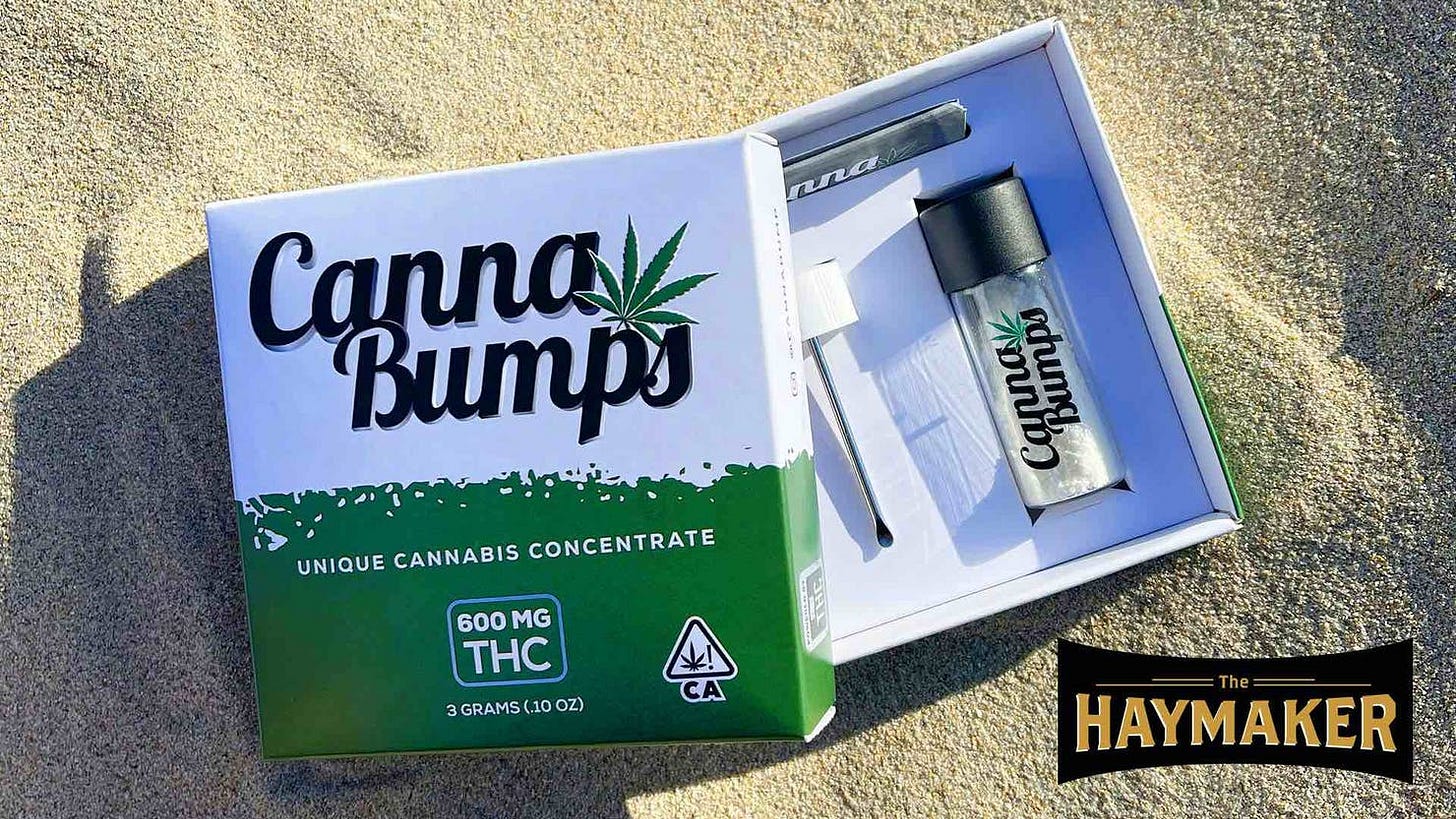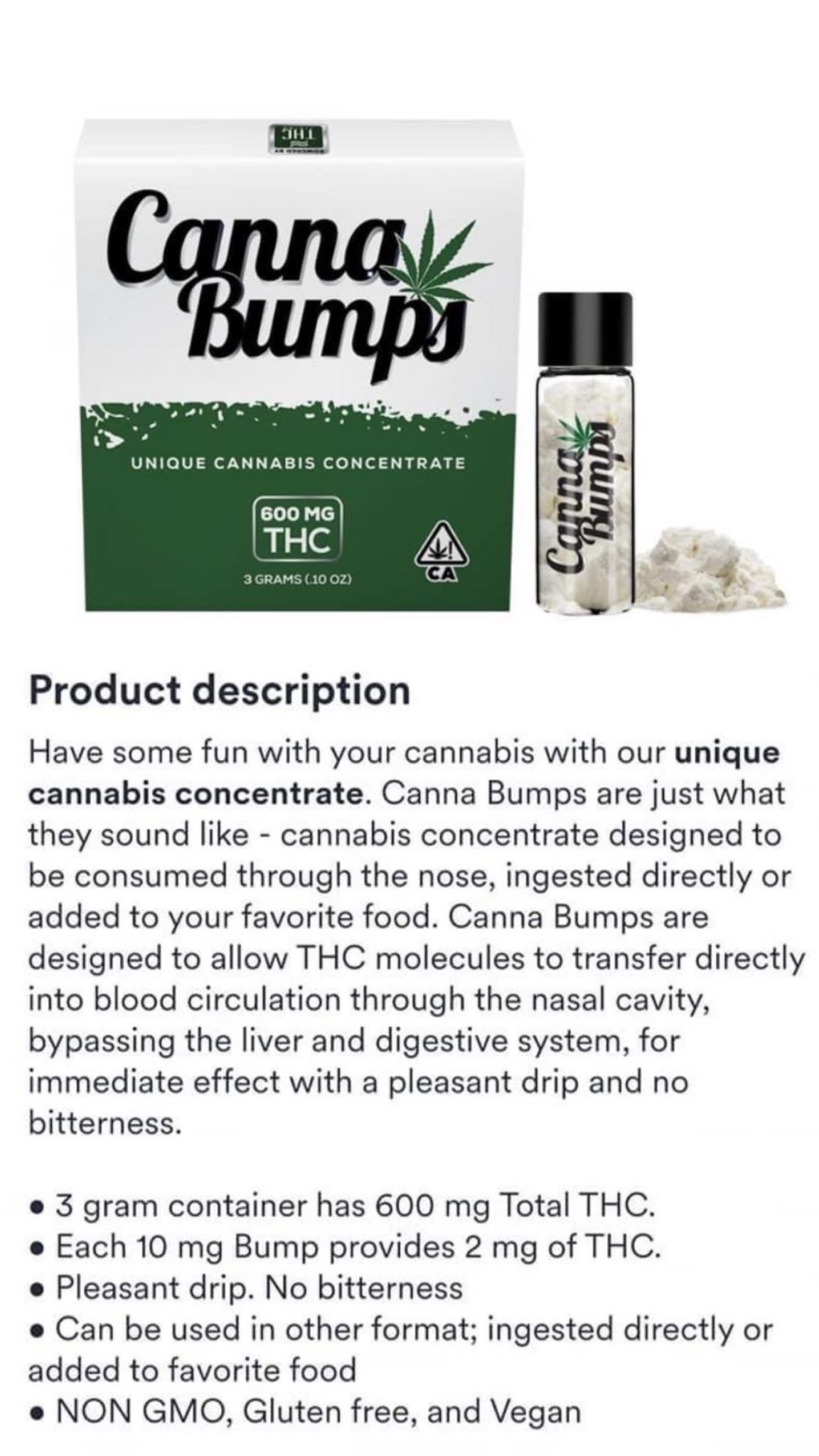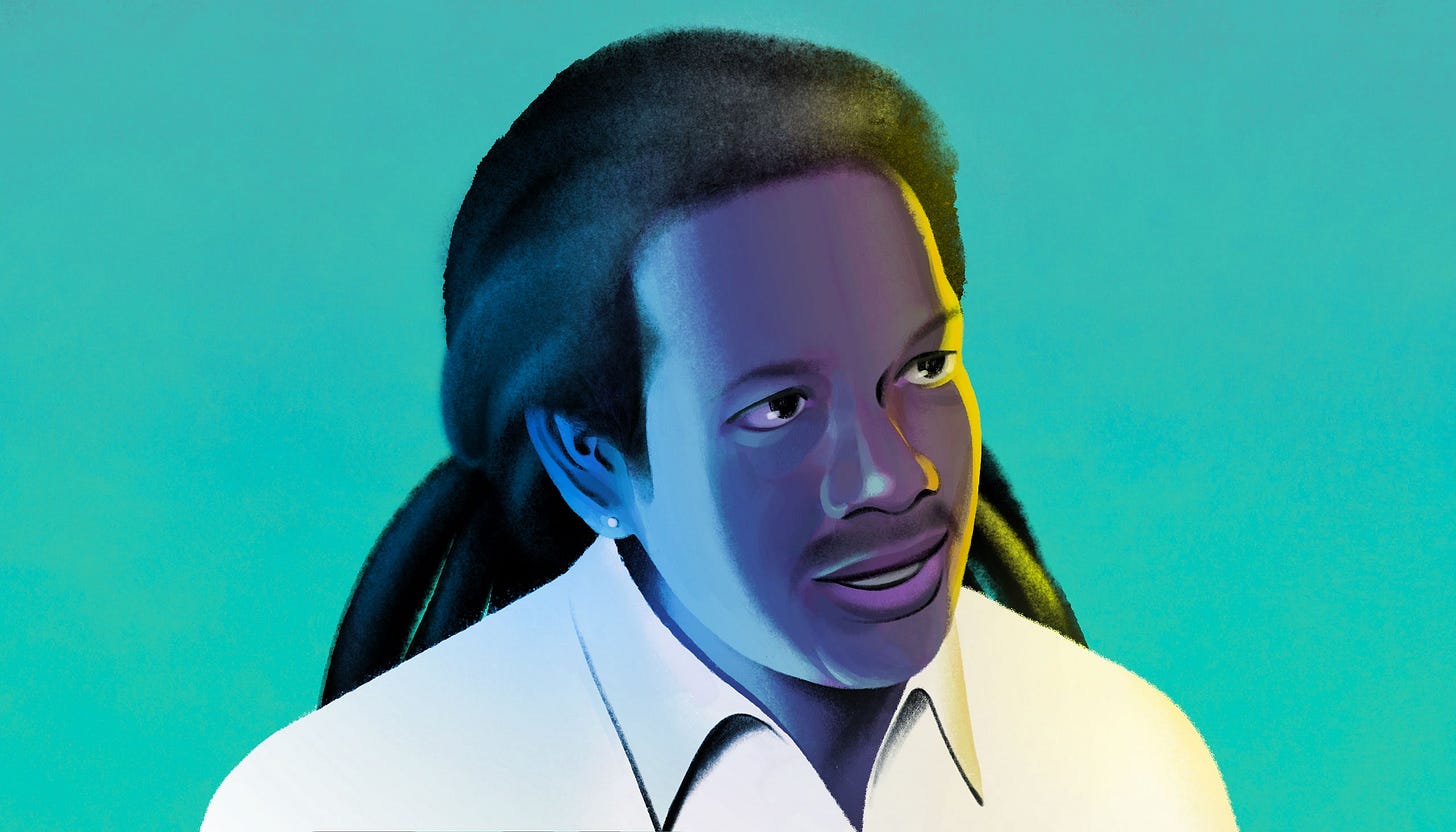A SCANDAL OVER SNORTING WEED
A new product called CANNABUMPS has the weed world in a tizzy
Scouring the web this week for SWAG BAG—Rave New World’s roundup of the dopest weed + drug products—I came across an extremely rare drop that is going super-viral, taking over social media and disappearing instantly off dispensary shelves. (h/t cannabis journalist Mary Carreon, who first brought this to my attention) This swag is called CANNABUMPS, and it is a vial of snortable THC powder that is pictured in PR photos with a mini-spoon and straw for convenient nose-shoveling.
Peep the product description:
“Pleasant drip.”
LMAOOOooOOO
Obviously I knew I had to try this revolutionary product, if only so I could bust it out at the next house party and disappoint all the coke fiends. The problem was that, after DMing the brand THC Living’s Instagram and hitting up their publicist over email, all I got was crickets. (The brand later deleted their account.) Meanwhile, the weed world was roiling in controversy—Cannabumps had become the biggest scandal since the 2019 vape crisis. The majority opinion: How dare a company market cannabis like it’s cocaine!!!
But what’s really going on here? Let’s go *sniffing* around!
Come with me behind the paywall into the subscriber-only sanctum, where in Friday’s edition of SWAG BAG, we’ll dive into what the fuck is up with Cannabumps—and what it can tell us about this weird moment in weed.
This is more than a story about a cannabis company with a long history of sketchiness. The scandal that erupted over snorting THC is also a portal into a complex convo on evolving weed regulations + technologies, what defines “harm reduction,” and the stickiness of drug stigmatization within the cannabis scene.
In other words, what are people really outraged about, when they get pissed about snorting weed?
THE BUZZ
A roundup of this week’s buzziest stories on drugs + parties, with a light sprinkling of my takes
MDMA reaches the final stage of FDA approval (New York Times)
A new study has found that MDMA significantly reduced symptoms of PTSD when paired with talk therapy, allowing the drug also known as Molly (you know her…) to progress into the final stage of FDA approval before it gets legalized. This is the first phase-3 trial conducted on any psychedelic therapy, which is pretty wild—and the results are promising: two months after treatment, 67 percent of participants were no longer diagnosed with PTSD.
Per the Times:
Unlike traditional pharmaceuticals, MDMA does not act as a band-aid that tries to blunt symptoms of PTSD. Instead, in people with PTSD, MDMA combined with therapy seems to allow the brain to process painful memories and heal itself, Dr. Mitchell said.
I do have reservations about how legal MDMA is being used to aid US imperialism—this study (and others) targeted military vets with PTSD, and there is a case to be made that legalizing Molly is actually going to strengthen the military industrial complex by soothing its nasty side-effects.
What’s also important to note here is legal MDMA will only be approved by the FDA when it’s paired with therapy—so you won’t be able to buy Ecstasy pills in some futuristic raver dispensary. In fact, MDMA has a long history with psychotherapy… it was administered by therapists in the late 70s and early 80s, until it “escaped” to nightlife dancefloors and became stigmatized… then was criminalized by the DEA in 1985. Now she’s back, bitch—experts are saying legal MDMA could arrive by 2023.
The UK experiments with its first legal raves (Resident Advisor)
Two 3000-person raves took place in a warehouse in Liverpool last weekend, marking the first legal raves in the UK since the start of the pandemic. Obviously we all know that illegal renegades have been popping off all over Europe and America to much controversy (we even dove into the debate)… but these two warehouse parties—DJ’ed by Jayda J, Sven Vath, and The “Blessed” Madonna—were actually experiments to see how they would affect Liverpool’s COVID case count.
Per RA:
Attendees needed a negative lateral flow test before arriving to the venue, and then their personalised ticket would be validated against the test. They also had to prove that they live within the Liverpool city region. Once inside the event, there were no rules on social distancing or masks.
Mixmag also interviewed the promoter behind the parties, Circus founder Yousef, and found out that he had consulted with PRINCE FUCKING WILLIAM:
I was speaking to my local MPs, and then the Liverpool authority, and very quickly I managed to get some traction with getting some energy behind trying to get some support. Then it went very quickly. Unbelievably within two weeks Prince William had heard about my efforts and wanted a 45 minute conversation with me on Zoom about what was happening in Liverpool.
Honestly I would not be surprised if Prince William is secretly a tech-house DJ…
Anyway—the results of these UK test-raves have not been released, but they come on the heels of a similar + successful 5,000-person rave in Spain with no sign of transmissions.
Is there a case for legalizing heroin? (The New Yorker)
New Yorker dropped a piece on Carl Hart, a Columbia professor and drug researcher who recently released an extremely buzzy book called Drug Use for Adults where he opens up about his own use of heroin, and argues against the distinction between hard and soft drugs.
Benjamin Wallace-Wells writes:
Hart is sharply critical of the distinctions that liberals often draw between hard and soft drugs: he quotes Bernie Sanders’s claim that marijuana is different from “killer drugs” and calls that view “ignorant.” Hart agrees with the scientific consensus that heroin is more likely to create a physical dependence than psychedelics or marijuana, but he does not believe that a heroin user is less likely to be functional than a user of “soft” drugs, a position that puts him outside the mainstream. He writes, “Neither heroin nor marijuana is inherently more evil than the other.”
Hart tells the New Yorker about how his pro-heroin stance distinguishes him from the dominant culture of neoliberal government paternalism, and is also a direct response to the deaths of George Floyd and Breonna Taylor. The piece also gets into the public reception to the book, especially the skepticism and criticism from other scientists and academics.
I think Hart’s book, while flawed, is groundbreaking and has pushed a really important conversation into the mainstream—it came up a lot during the interviews I did for my Cannabumps story. We’ll get into this more in tomorrow’s subscriber-only post!






